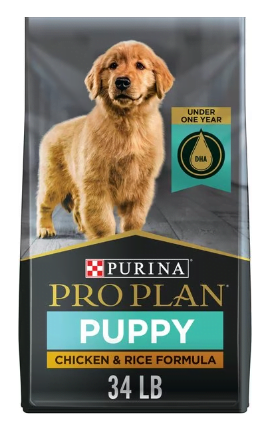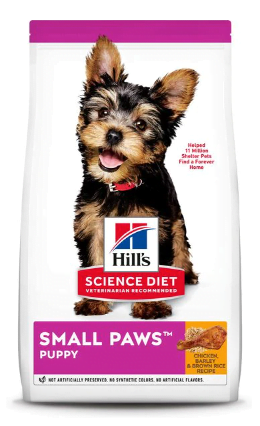5 Best Dog Food for Puppies for 2023 | Dry Food
When you bring a new, bouncing puppy into your home, you’re not just getting a pet – you’re getting a new family member. This adorable bundle of joy depends on you for love, care, and nourishment. And among these, nourishment stands paramount for your puppy’s growth and health.
But why is a balanced diet so important for puppies, and how are their nutritional needs unique compared to their adult counterparts? Let’s delve into this crucial topic.
A balanced diet provides the building blocks of your puppy’s future. The food your puppy consumes directly affects their development, health, and even behavior. It’s not just about keeping their tummies full, it’s about giving them the right nutrients in the right proportions.
From developing a robust immune system to supporting bone and muscle growth, good nutrition plays a pivotal role in every aspect of their young lives.
A balanced diet for puppies goes beyond just providing them with energy. It comprises a complex combination of proteins, fats, carbohydrates, vitamins, minerals, and water, each serving their unique purpose in promoting growth and overall well-being.
Let see what’s the best food for your puppies!
Best food for Puppies (Recommended by the Author) Top 3
Purina Pro Plan Puppy
Iams ProActive Health
Royal Canin Size Health
Best food for puppies
- Hill’s Science Diet Puppy Large
- Blue Buffalo Life Protection
- Iams Advanced Health
- Diamond Puppy Formula
- Hill’s Science Diet Puppy Small
Hill’s Science Diet Puppy Large
This delectable puppy food, crafted with real chicken and precise amounts of calcium, is specifically designed to regulate bone growth in large breed puppies – a unique requirement during their development stage. This recipe offers a well-rounded diet with balanced minerals, nurturing strong bones and teeth.
Prepared with natural ingredients, the food integrates DHA from fish oil, which aids in your puppy’s eye and brain development. Additionally, the inclusion of high-quality protein ensures your little giant builds and sustains muscle, paving the way for countless exciting adventures!
First 3 Ingredients : Chicken, Brown Rice, Whole Grain Oats
Best for breed size: Large Breeds, Giant Breeds
Caloric Content: 3628 kcal/kg
Feeding Instruction
*(cups per day)
| Weight of Dog | Less than 4 Months | 4 to 9 Months | 10 to 12 Months | 13 to 18 Months |
| 2 lb | 1/2 | |||
| 5 lb | 1 | |||
| 8 lb | 1 3/8 | |||
| 10 lb | 1 2/3 | |||
| 20 lb | 2 3/4 | 2 1/3 | ||
| 40 lb | 4 2/3 | 4 | 3 | |
| 60 lb | 6 1/3 | 5 1/3 | 4 1/4 | 3 3/4 |
| 80 lb | 6 1/2 | 5 1/4 | 4 3/4 | |
| 100 lb | 7 3/4 | 6 1/4 | 5 2/3 | |
| 120 lb | 7 | 6 1/3 | ||
| 140 lb | 8 | 7 1/4 | ||
| 160 lb | 8 3/4 | 8 | ||
| 180 lb | 9 2/3 | 8 2/3 | ||
| 200 lb | 10 1/2 | 9 1/3 |
Blue Buffalo Life Protection
The Blue Buffalo Life Protection Formula is specially designed to enhance the health and overall well-being of dogs. Its recipes begin with real meat, complemented by whole grains, garden-fresh vegetables, and fruits. In addition, the formula includes LifeSource Bits, a meticulously curated blend of nutrients, fortified with a Super 7 package comprising antioxidant-rich components.
First 3 Ingredients : Deboned Chicken, Chicken Meal, Brown Rice
Best for breed size: Large Breeds, Giant Breeds
Caloric Content: 386 kcal/cup
Feeding Instruction
*(cups)
| Weight of Dog | 1-3 months | 3-5 months | 5-7 months | 7-12 months |
| Up to 5 lbs | 1/2 – 1 | 1/4 – 3/4 | 1/4 – 1/2 | 1/4 – 1/2 |
| 6 – 10 lbs | 1 – 1 3/4 | 3/4 – 1 1/4 | 1/2 – 1 | 1/2 – 1 |
| 11 – 20 lbs | 1 3/4 – 2 3/4 | 1 1/4 – 2 | 1 – 1 3/4 | 1 – 1 1/2 |
| 21 – 40 lbs | 2 3/4 – 4 3/4 | 1 3/ 4 – 3 | 1 3/4 – 2 3/4 | 1 1/2 – 2 1/2 |
| 41 – 60 lbs | 4 3/4 – 6 1/4 | 3 – 4 1/4 | 2 3/4 – 3 3/ 4 | 2 1/2 – 3 1/4 |
| 61 – 80 lbs | – | 4 1/4 – 5 1/4 | 3 3/ 4 – 4 3/4 | 3 1/4 – 4 1/4 |
Iams Advanced Health
Assist your little pup in achieving her utmost potential with Hill’s Science Diet Puppy Chicken & Barley Recipe! This puppy food is meticulously formulated with essential nutrients, supporting five critical building blocks for your furry friend’s enduring health.
Every serving contains DHA from fish oil, encouraging healthy brain and eye development. The high-quality protein in the mix aids in building lean muscles. Alongside, balanced minerals foster the growth of strong bones and teeth. This particular Hill’s Science Diet Puppy recipe incorporates a special blend of prebiotic fibers, which work to bolster gut microbiome and digestive health.
Additionally, the blend of vitamin E and omega-6 fatty acids contribute to maintaining a healthy skin and a glossy coat. In simple terms, this puppy food provides a comprehensive nutritional package to support your pup’s healthy growth and development.
First 3 Ingredients : Chicken, Brown Rice, Whole Grain Wheat
Best for breed size: Small Breeds, Medium Breeds, Large Breeds, All Breeds
Caloric Content: 3747 kcal/kg
Feeding Instruction
* cups
| Weight of Dog | Less Than 4 Months | 4 to 9 Months | 10 to 12 Months |
| 2 lb | 1/2 | 3/8 | 1/3 |
| 5 lb | 1 | 7/8 | 2/3 |
| 8 lb | 1 1/2 | 1 1/4 | 1 |
| 10 lb | 1 3/4 | 1 1/2 | 1 1/8 |
| 20 lb | 3 | 2 1/2 | 2 |
| 40 lb | 5 | 4 | 3 1/4 |
| 60 lb | 6 2/3 | 5 1/2 | 4 1/2 |
| 80 lb | 8 1/4 | 7 | 5 1/2 |
| 100 lb | 9 3/4 | 8 1/4 | 6 1/2 |
| 120 lb | 11 1/4 | 9 1/3 | 7 1/2 |
Diamond Puppy Formula
Treat your puppy pal with the top-tier nutrition found in Diamond Puppy Formula Dry Food. Crafted with the finest ingredients, this food is designed to enrich your puppy’s diet with optimal levels of protein, fat, and other essential nutrients.
This formula is specially tailored to cater to the unique nutritional needs of fast-growing puppies. It includes DHA sourced from salmon oil, which aids in promoting sharp vision and a healthy brain. The food is also enriched with antioxidants and dietary fiber, offering vital support for your puppy’s digestion and immune system.
First 3 Ingredients : Chicken Meal, Whole Grain Ground Corn, Wheat Flour
Best for breed size: Small Breeds, Medium Breeds, Large Breeds, All Breeds
Caloric Content: 441 kcal/cup
Feeding Instruction
*Daily Feeding
| Weight | 2-4 Months | 4-8 Months | Ages 8-12 Months | Adult Dogs |
| 3 lbs | 2/3 cup | 1/2 cup | 1/3 cup | 1/3 cup |
| 5 lbs | 3/4 cup | 3/4 cup | 2/3 cup | 1/2 cup |
| 10 lbs | 1 1/2 cups | 1 1/4 cups | 1 cup | 3/4 cup |
| 20 lbs | 2 1/2 cups | 2 1/4 cups | 1 2/3 cups | 1 1/3 cups |
| 30 lbs | 3 1/3 cups | 2 3/4 cups | 2 1/4 cups | 1 3/4 cups |
| 40 lbs | 4 1/4 cups | 3 1/2 cups | 2 3/4 cups | 2 1/4 cups |
| 60 lbs | – | 4 3/4 cups | 3 3/4 cups | 3 1/4 cups |
| 80 lbs | – | 5 3/4 | 4 2/3 cups | 3 3/4 cups |
| 100 lbs | – | – | 5 1/2 cups | 4 1/2 cups |
Hill’s Science Diet Puppy Small
Treat your petite pup with the big flavors of Science Diet Puppy Small Paws Chicken & Barley Recipe! This delicious dog food, packed with DHA from fish oil, aids in the healthy development of your puppy’s brain and eyes, making it perfect for your little or mini furry friend.
It is formulated with high-quality protein that helps build lean muscles, and balanced minerals that contribute to strong bones and teeth. A fantastic blend of prebiotic fibers helps maintain a healthy gut microbiome and aids digestion.
Additionally, the presence of vitamin E and omega-6 fatty acids keeps your puppy’s skin healthy and their coat shiny.
First 3 Ingredients : Chicken, Whole Grain Oats, Brown Rice
Best for breed size: Small Breeds, Extra Small Breeds
Caloric Content: 3780 kcal/kg
Feeding Instruction
*cups
| Weight of Dog | Less than 4 Months | 4 – 9 Months | 10 – 12 Months |
| 2 lb | 1/2 | 3/8 | 1/3 |
| 5 lb | 1 | 7/8 | 2/3 |
| 8 lb | 1 3/8 | 1 1/8 | 7/8 |
| 10 lb | 1 5/8 | 1 3/8 | 1 1/8 |
| 15 lb | 1 7/8 | 1 1/2 | |
| 20 lb | 2 1/3 | 1 3/4 | |
| 25 lb | 2 3/4 | 2 1/4 | |
| 30 lb | 3 | 2 1/2 |
Buying Guide: Food for Puppies
When it comes to selecting the right food for your adorable puppy, there are several essential factors to consider. A well-balanced diet is crucial during this stage of rapid growth and development. Here’s a buying guide to help you make the best choice for your furry friend:
Age and Size: Puppies have different nutritional needs based on their age and size. Look for puppy-specific formulas designed to support their growth and energy requirements. Small breed puppies may have different nutritional needs compared to large breed puppies, so choose accordingly.
High-Quality Ingredients: Opt for dog foods with high-quality protein sources like chicken, turkey, or lamb. Avoid products with excessive fillers, artificial preservatives, and additives. Whole grains, fruits, and vegetables are beneficial for providing essential vitamins and minerals.
Essential Nutrients: Ensure the puppy food you choose includes essential nutrients like protein, fat, carbohydrates, vitamins, and minerals. Protein supports muscle development, while fats provide energy. Calcium and phosphorus are vital for healthy bones and teeth.
AAFCO Approval: Look for dog foods that are AAFCO (Association of American Feed Control Officials) approved. This certification indicates that the food meets the minimum nutritional requirements for puppies.
Special Dietary Needs: If your puppy has specific health concerns or dietary sensitivities, consult your veterinarian for guidance on selecting appropriate dog food.
Key Nutrients for Puppies
When it comes to feeding your puppy, it’s crucial to understand the key nutrients they need for healthy growth and development. Puppies require a diet rich in proteins, fats, vitamins, minerals, and fiber, each of which plays a unique role in their wellbeing.
Proteins and their Importance: Proteins serve as the building blocks for cells, tissues, organs, enzymes, hormones, and antibodies, and are vital for growth, maintenance, reproduction, and repair. For puppies, a diet rich in high-quality protein is essential to ensure they grow and develop properly. This nutrient aids in the development of lean muscle mass and supports healthy skin and coat.
Fats and their Benefits: Fats provide the most concentrated source of energy for puppies. They help the body absorb vitamins and promote a healthy nervous system. Furthermore, specific fats, like Omega-3 and Omega-6 fatty acids, play a vital role in brain development, immune function, and skin and coat health.
Vitamins and Minerals: These are essential nutrients needed in small amounts to perform a variety of roles, from promoting strong bones and teeth (calcium, phosphorus) to supporting vision and brain health (vitamin A, DHA). Vitamins and minerals are crucial for regulating body functions and maintaining overall health.
Fiber: While often overlooked, dietary fiber is beneficial for puppies’ digestive health. It can help firm up loose stools, reduce the risk of constipation, and promote a sense of fullness, which can be especially useful in managing the feeding of fast-growing, energetic puppies.
Is dry food good for a puppy?
Many experts believe that high-quality dry food can be a good option for puppies. Dry food is convenient and can help keep a puppy’s teeth clean. It usually contains all the essential nutrients a growing pup needs, such as proteins, vitamins, and minerals.
However, it’s important to choose a reputable brand that is specially formulated for puppies to ensure they get the right nutrition. Remember to provide fresh water alongside dry food and consult with your veterinarian to determine the best diet for your furry friend.
Considerations for Feeding Puppies
When it comes to feeding puppies, several factors need to be taken into account to ensure they receive the right nutrients in the correct proportions. This not only supports their healthy growth but also ensures they transition smoothly from puppyhood to adulthood.
Small Breed Puppies Vs. Large Breed Puppies: The nutritional needs of puppies can differ significantly based on their breed size. Small breed puppies tend to mature faster than their larger counterparts, requiring diets higher in calories, protein, and fat. Large breed puppies, on the other hand, need controlled levels of calcium and phosphorus to support balanced growth and prevent skeletal problems. Hence, it’s essential to choose a food that’s specifically tailored to your puppy’s breed size.
Feeding Schedules and Portion Sizes: Puppies typically need more frequent feedings and specific portion sizes. Young puppies should be fed 3 to 4 times a day, while older puppies can be transitioned to 2 meals a day.
The portion sizes should align with your puppy’s age, size, breed, and energy level. Remember, overfeeding can lead to obesity, so it’s crucial to maintain a balanced diet that meets their nutritional needs without excess calories.
Transitioning from Puppy Food to Adult Dog Food: Transitioning your puppy from puppy food to adult dog food is a significant step and should be done gradually to avoid digestive upset. This typically occurs when your puppy reaches maturity, which can vary based on breed size.
Small breed dogs usually transition at around 9 to 12 months, while large breed dogs might not transition until they are 12 to 24 months old. Gradually mix the adult food into the puppy food over a week or so, increasing the adult food’s proportion every few days.
What foods are really good for puppies?
Feeding a puppy a balanced and nutritious diet is crucial for their growth and development. Here are some foods that are generally considered good for puppies:
- High-Quality Puppy Food: Choose a commercial puppy food that is specially formulated to meet the nutritional needs of growing dogs. Look for options with real meat as the primary ingredient and minimal fillers.
- Protein-Rich Foods: Puppies require more protein than adult dogs for muscle development. Include lean meats like chicken, turkey, beef, and lamb in their diet.
- Whole Grains: Whole grains like brown rice, oatmeal, and quinoa provide carbohydrates for energy. They also offer essential nutrients and fiber.
- Fruits: Incorporate small amounts of puppy-safe fruits like blueberries, apples (without seeds), and bananas. These provide vitamins, antioxidants, and natural sweetness.
- Vegetables: Puppy-friendly vegetables such as carrots, green beans, and sweet potatoes are a good source of vitamins, minerals, and fiber.
- Dairy: Plain yogurt or cottage cheese in moderation can be beneficial due to their calcium and protein content. Ensure your puppy isn’t lactose intolerant.
- Healthy Fats: Include sources of healthy fats like fish oil or flaxseed oil to support their skin, coat, and overall health.
- Eggs: Eggs are a great source of protein and contain essential amino acids. Cooked eggs are easier for puppies to digest.
- Fish: Cooked and deboned fish like salmon provides omega-3 fatty acids, which are beneficial for brain and eye development.
- Avoid Harmful Foods: Some human foods are toxic to dogs and should be avoided, including chocolate, grapes, raisins, onions, garlic, avocados, and foods high in salt or artificial sweeteners.
Consult Your Veterinarian Every puppy is different, and dietary needs can vary based on breed, size, and health status. It’s always best to consult your veterinarian for personalized recommendations.
Remember to introduce new foods gradually and monitor your puppy’s response. Overfeeding can lead to obesity, so follow portion recommendations on the food packaging and adjust according to your puppy’s growth and activity levels. Access to fresh water at all times is essential as well.
Understanding Dog Food Labels
Deciphering dog food labels can often feel like you’re trying to translate a foreign language. However, understanding them is crucial for choosing the best food for your pup. Here’s a rundown of what to look for and how to interpret what you find.
Key Components to Look Out For: Every dog food label will list the ingredients and the guaranteed analysis. Ingredients are listed in descending order by weight, so you want to see quality sources of protein (like named meats or meat meals) at the top of the list.
The guaranteed analysis will give you the minimum percentages of crude protein and fat, and the maximum percentages of fiber and moisture. This gives you a way to compare nutrient profiles across different brands and formulas.
What Certain Claims on the Package Mean: “Natural,” “organic,” “premium” – these are marketing terms that might not hold as much value as you’d think. For example, for a food to be labeled as “organic,” it just has to contain 95% organic ingredients. Also, “premium” doesn’t mean the food offers premium nutrition.
It’s important to focus on the ingredient list and nutritional adequacy statement (which tells you if the food meets the nutritional levels established by AAFCO) more than these claims.
Recognizing Potential Red Flags: Be wary of foods that list “meat” as a primary ingredient without specifying the type, or use “meat by-products.” These are lower-quality sources of protein. Also, avoid foods that rely heavily on unnamed grains or other fillers, which offer fewer nutrients and can be harder to digest. Finally, watch out for artificial colors, flavors, and preservatives, as they can contribute to allergies and other health issues.
Conclusion
To sum it all up, proper nutrition plays a pivotal role in your puppy’s growth, health, and overall wellbeing. The first year of your furry friend’s life is crucial, and providing them with a diet rich in proteins, fats, vitamins, minerals, and fiber will ensure they grow and develop optimally.
Keep in mind that the nutritional needs of puppies can vary significantly depending on their breed, size, and specific health conditions. Hence, it’s important to understand your puppy’s unique nutritional needs and read dog food labels carefully.
Nevertheless, while this guide offers general advice, there’s no substitute for professional advice tailored to your puppy. Always consult with a veterinarian or a pet nutrition expert to determine the best diet for your puppy.
Remember, every puppy is different, and what works best for one may not be suitable for another. Your journey to discover the best food for your puppy might require some trial and error, but it’s a labor of love that pays off when you see your pup grow into a healthy, happy, and active dog.
FAQ
Subscribe to our weekly newsletter below and never miss the latest article.















